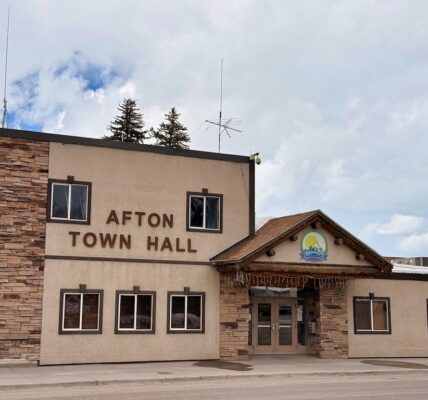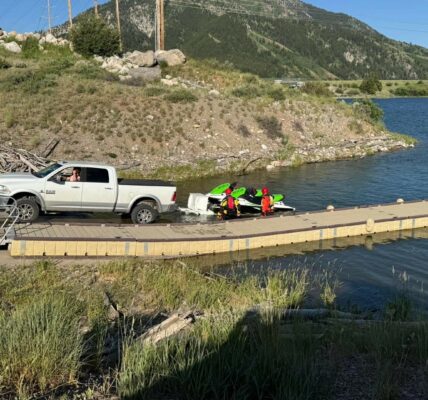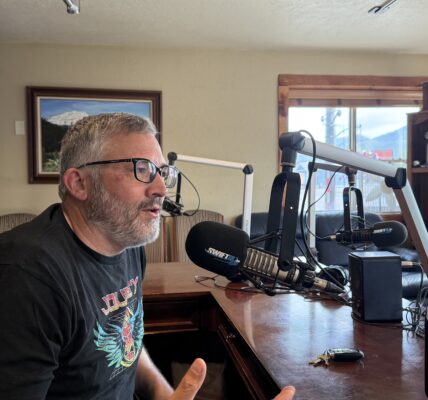Agencies fight release of Wyoming police shooting settlements despite high court ruling

By Sofia Saric, Casper Star-Tribune
Tennessee Watson, WyoFile.com
Via- Wyoming News Exchange
CASPER — The Wyoming Supreme Court ruled in August that settlement agreements involving government entities are subject to the transparency requirements of the Wyoming Public Records Act, even when those settlements include confidentiality provisions.
At a glance, the court’s decision seemed a clear and sweeping victory for public access to public information.
“My read on the … case is that governmental entities can no longer hide behind the facade of these so-called confidentiality agreements in their settlement documents,” one of the attorneys involved said of the ruling.
Yet when multiple reporters, and at least one lawmaker, cited the court’s opinion in renewed attempts to obtain previously withheld settlement agreements involving police killings, they were again denied access by government entities, raising the specter of yet another long and costly court fight.
The Gates v. Memorial Hospital ruling stemmed from a malpractice suit in Gillette, in which Jessica Gates asked Memorial Hospital of Converse County to provide copies of settlement agreements that disclosed payouts to patients. The hospital, in this case a government entity, declined to produce the contracts, so Gates called on Converse County District Court to compel disclosure, the ruling states.
The district court ultimately required Memorial Hospital of Converse County to produce the records, but also imposed a protective order on them.
Gates appealed this decision to the Wyoming Supreme Court, which ruled that records involving public agencies’ dealings with public funds are public records. They involve money, which in part, was collected through people’s taxes, the court noted, all of which subject those records to the Wyoming Public Records Act, the law governing the release of state and local documents.
“A district court lacks inherent power, equitable or otherwise, to issue a protective order to close public records the WPRA itself does not exempt,” the court wrote in its conclusion.
What appear to be the first attempts at applying the high court’s directive to similar records held elsewhere, however, have met stiff resistance from other local government entities.
Asked to provide the Casper Star-Tribune and WyoFile with settlement records regarding the police shootings of Douglas Oneyear and Robbie Ramirez, the city of Casper and Albany County have each, instead, moved to fight disclosure in the courts.
Members of the public, in the meantime, remain in the dark about how much of their money was spent making these wrongful death lawsuits go away, and whether any policies were changed as a result of these agreements.
What happened at the Casper Star-Tribune?
Douglas Oneyear was killed by two Casper police officers on Feb. 25, 2018. On the first anniversary of Oneyear’s death, his mother Linda Lennen filed a wrongful death lawsuit against the officers and the city. (Prosecutors had by then separately cleared the officers of any criminal wrongdoing in the shooting.) A years-long legal battle ensued.
The parties agreed to settle on July 10 of this year, less than two weeks before a jury trial was set to begin.
Lennen and her attorney Todd Hambrick are unable to comment on any details of that agreement because it contained a confidentiality clause, Hambrick told the Star-Tribune.
“I will say, however, that the City, litigating this matter for over five years only to settle the case weeks before trial, when they could have settled it five years ago avoiding all of that expense, is quite frankly, inexcusable,” Hambrick wrote in an email.
The Star-Tribune immediately filed a records request for the settlement, but it was denied on July 18 because “these records are not in the possession of the City of Casper,” City Attorney Eric Nelson said.
“The Wyoming Association of Risk Management, our self-insurance liability pool, is the custodian of those records.”
That same day, Joe Constantino, executive director of WARM, also denied providing the documents “due to the terms of the settlement agreement.”
On Aug. 8, as the requesting reporter considered her next steps, the Wyoming Supreme Court issued its Gates ruling, clarifying that settlement agreements fall under the state’s public records law and confidentiality clauses cannot be used to shield them across the board.
The Star-Tribune filed an appeal with Wyoming’s public records ombudsman Charlotte Martinez three days later.
The ombudsman post is designed to resolve public record disputes without a costly, time-consuming court battle.
After almost two months of back-and-forth, WARM “determined that it needs to obtain guidance on this complicated issue from the district court,” Constantino said in an email, which was shared by Martinez.
Martinez chose not to rule either way, preferring to let the courts decide instead. She noted the “Wyoming Public Records Act specifically notes filing with the district court for several reasons, none of which seem particularly applicable in this case,” Martinez wrote. “I will be interested to see this filing as well.”
WARM and the city of Casper filed a motion on Oct. 2 to restrict disclosure to the Star-Tribune.
What happened at WyoFile?
On Nov. 4, 2018, then-Albany County Sheriff’s Deputy Derek Colling pulled Robbie Ramirez over for a minor traffic violation. Within minutes, Colling shot Ramirez twice in the back. Ramirez, a 39-year-old Laramie resident, was unarmed and living with mental illness. He died at the scene, feet from his own front door.
After an investigation into Colling’s use of lethal force — his third in uniform — Albany County Prosecuting Attorney Peggy Trent declined to bring charges against the deputy for Ramirez’s death.
Then in September 2020, Ramirez’s mother Debra Hinkel filed a federal wrongful death lawsuit. Court proceedings lasted close to two years before the parties reached a settlement in May 2022.
Albany County denied WyoFile’s initial Aug. 22, 2022 public records request for the settlement agreements because the documents were “privileged or confidential by law,” then-County Clerk Jackie Gonzales wrote in an email on Oct. 2, 2022.
Ten months later, following the Gates v. Memorial Hospital decision, WyoFile resubmitted its request to Albany County on Aug. 22 of this year, this time citing the fresh precedent. Albany County responded on Sept. 15, filing in the 2nd District Court in Laramie to block WyoFile’s access to the requested settlement agreements.
In a motion, John Bowers, an Afton-based attorney hired to represent the county, argued that releasing the settlement documents in full “would affect the future government operations of a Wyoming Governmental entity and cause substantial injury to the public.”
Judge Misha Westby has yet to rule on Albany County’s filing.
Bigger than money In both Albany County and Casper, the lawsuits could only reach so deep into public coffers because legal costs and settlement fees are covered by insurance: WARM in Casper and the Local Government Liability Pool in Albany County. The county paid $62,771.00 for a policy in 2021-2022 and $65,413.00 for 2022-23 coverage, records requested by WyoFile show.
Much like a co-pay for a visit to the doctor’s office, Albany County also paid a $5,000 deductible for the settlement regarding Hinkel v. Albany County in August 2022, county records also show.
The exact settlement amount Hinkel received is unclear, but the Local Government Liability Pool limits coverage per federal lawsuit to $1.5 million, the insurer’s executive director Torey Racines said.
In the three years he’s been director, the organization has not been involved with a lawsuit that settled beyond the limit, Racines said.
His predecessor, Mike Todd, said during his time as director, “we have never received a judgment or settled up to these limits.”
Colling and O’Malley were covered separately by the state-funded Self-Insurance Program, which is statutorily obligated to defend peace officers acting within the scope of their duties.
Erin Edwards, who oversees the Self-Insurance Program, would not disclose whether state funds contributed to the Hinkel settlement, citing state statute that says, “claim files maintained by the risk manager shall be considered privileged and confidential.”
However, what the state spends on the settlement of peace officer claims is publicly available in an annual report the Self-Insurance Program presents to the Legislature. In 2022, the state paid $1,322,108 on 19 settlements involving peace officers. That’s $523,760 more than the state has spent since 2018.
Whether any of those public funds went to Hinkel remains shielded from the state’s taxpayers.
It’s not just the money that matters, First Amendment attorney Bruce Moats said.
“Sometimes in a settlement agreement, there’ll be … things other than money where the government agrees to do certain things,” Moats said.
Those actions might include policy changes like requiring more training, which is important for the public to know when evaluating government performance.
Regardless of whether an insurance company or a government entity pays the settlement, it is still an agreement entered into by a government entity, and therefore a public record, said John Cotton, the attorney who successfully argued for transparency in the Gates v. Memorial Hospital case before the Wyoming Supreme Court.
Moats agreed.
“I don’t care if it’s insurance,” he said. “It’s all public funds that’s paid on our behalf.”
The Local Government Liability Pool is paying for Bowers to represent Albany County’s efforts to block WyoFile’s access to the Hinkel settlement, Racines said. When asked if the organization had a direct interest in fighting the release of the settlement agreement, Racines said no.
“We have a unique circumstance here where the understanding of the law changed,” he said, “and so that’s why LGLP is paying for the clarification of what [Albany County’s] obligations are.”
The insurer’s continued involvement in resolving whether the Hinkel v. Albany County settlement should be publicly available is “to complete the circle, and what the court says, is what the court says,” Racines said.
Hinkel, through her attorneys, communicated to the county and WyoFile that she would like the settlement documents made public.
Also party to the settlement agreement is Dave O’Malley, who served as Albany County sheriff at the time of Ramirez’s death, and Deputy Colling, who is no longer with the department. Whether O’Malley would consent to the release of the settlement documents is unknown. His attorney has yet to respond to WyoFile.
Colling’s attorney, Stephenson Emery, said in an email to a colleague, which he also sent to WyoFile, that he is working “to prevent the disclosure of the Release, or at least to redact the language about the motion for default judgment.”
The motion for default judgment — filed by Hinkel’s attorneys in March 2022 — alleged the sheriff’s office altered videos of Colling killing Ramirez by deleting damning scenes and therefore asked the judge to rule the shooting of her son “was unreasonable as a matter of law.”
Why a reference to the motion for default judgment — which U.S. District Court Judge Nancy Freudenthal dismissed after the settlement was reached — was included in the agreement is unclear, but it raises questions about whether the requested documents might contain information about the body- and dash-cam footage.
In its continued effort to obtain the Hinkel v. Albany County settlement agreement, WyoFile filed a Nov. 6 motion to intervene in Albany County’s lawsuit to block public access to those records. If granted intervenor status, WyoFile would be able to make its case in court as to why the settlement agreement should be available to the public.
Why it matters
The public’s trust in law enforcement is upheld by accountability and transparency, lawmakers and researchers say. When civilians are kept in the dark, it is harder for them to believe in the workings of police and government.
It’s not positive for community relations “when they can’t get answers, when they feel there’s secrecy, when they feel like law enforcement doesn’t answer to them, despite getting their paycheck from the public,” Rep. Karlee Provenza, D-Laramie, said.
In fact, Provenza also filed a records request for the settlement agreements in Ramirez’s case after spotting the Wyoming Supreme Court opinion, the lawmaker said. She has not been provided with the records either.
The argument that releasing the settlement agreement could harm public interest by opening up Albany County to additional lawsuits is a strategy to dodge accountability, Provenza said.
“[A]ctually, if you just dealt with your mess, and didn’t harbor people that were going to cause more litigation — that’s what would save taxpayers money — if the government did their job, not if we conceal the government failing to do their job,” Provenza said.
Provenza pointed to Ramirez’s case.
She believes withholding the settlement is an attempt to avoid litigation with Colling “instead of avoiding litigation with people who want public access to records.”
Motions filed by Bowers note Albany County’s concern “that release of the settlement agreement would be viewed as a breach of the confidentiality agreement by the parties” that would put the county “at risk by incurring additional litigation.”
Hinkel supports the release of documents, leaving Colling and O’Malley as the remaining parties who might sue.
Pete Gosar, chairman of the Albany County Board of Commissioners, did not respond by press time about whether Colling or O’Malley posed a threat of litigation.
Sen. Cale Case, R-Lander, understands there may be some arguments for individual privacy concerns within settlement agreements, but there may also be admissions of wrongdoing and commitment for better policy in the future, he said.
As long as public entities, public employees and public funds are affected, the public has a right to know.
“I can’t even imagine a good argument [for withholding],” Case said. “It’s totally contrary to the public interest. It is very unnerving.”
Despite lawmakers revising the public records act and creating an ombudsman, who is supposed to act as a neutral third party in disputes, “we still have frustrating difficulty getting information,” Case said.
Both Case and Provenza would be interested in drafting legislation that would clarify settlement agreements under the public records act and expand law enforcement transparency. But actually passing bills into law is another story, Case said.
Most members of the Legislature’s Joint Judiciary Committee are “pretty conservative” and so protective of law enforcement that they are not supportive of public information, Case said.
“I’m protective of law enforcement, and I think public information goes hand in hand with that. We protect our society and democracy with public information,” Case said. “…It’s like openness is going backwards, and maybe some of that is a sign of the times.”
Scott Wolfe is a professor of criminal justice at Michigan State University, who researches policing. He says law enforcement agencies garner public trust when officers practice procedural justice during encounters, ensure transparency and perform duties within the law, research shows. Some agencies may have state laws or policy provisions that prohibit them from releasing certain information, “but if agencies aren’t explaining that, that’s kind of a problem they need to address,” Wolfe said.
He advises law enforcement leaders to “educate your journalists, educate the public,” Wolfe said. “What are the constraints you’re facing? I want to be more transparent, but here’s why I can’t.”
If there aren’t legal limitations, a deeper conversation needs to be had about why information is being withheld, he said.
“Those are very different conclusions,” Wolfe said. “It just makes it worse if you don’t because then it makes it look like you’re trying to hide something.”
WyoFile is an independent nonprofit news organization focused on Wyoming people, places and policy.





